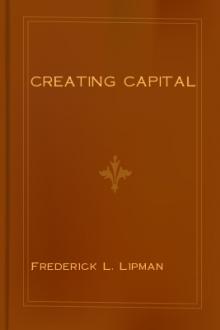The Man-Eaters of Tsavo - J. H. Patterson (funny books to read txt) 📗

- Author: J. H. Patterson
- Performer: -
Book online «The Man-Eaters of Tsavo - J. H. Patterson (funny books to read txt) 📗». Author J. H. Patterson
Passenger trains leave Mombasa at 11 a.m. on Mondays, Wednesdays, Fridays, and Saturdays, and are timed to arrive at Nairobi at 11:15 next morning and at Kisumu (the railway terminus on Lake Victoria Nyanza) at 9
o’clock on the morning following. The First-Class Return fares from Mombasa to Nairobi, Kisumu, and Entebbe are 5 pounds 17s. 9d., 10 pounds 10s. 3d., and 13 pounds 13s. 3d. respectively.
It is unnecessary to specify district by district when particular species of game are to be found, for the sportsman can easily learn this for himself and get the latest news of game movements on his arrival at Mombasa. As a matter of fact, the whole country abounds in game, and there cannot be lack of sport and trophies for the keen shikari. The heads and skins should be very carefully sun-dried and packed in tin-lined cases with plenty of moth-killer for shipment home. For mounting his trophies the sportsman cannot do better, I think, than go to Rowland Ward of Piccadilly. I have had mine set up by this firm for years past, and have always found their work excellent.
I consider that 400 pounds should cover the entire cost of a three months’ shooting trip to East Africa, including passage both ways. The frugal sportsman will doubtless do it on less, while the extravagant man will probably spend very much more.
Should time be available, a trip to the Victoria Nyanza should certainly be made. The voyage round the Lake in one of the comfortable railway steamers takes about eight days, but the crossing to Entebbe, the official capital of Uganda, can be done in seventeen hours, though it usually takes twenty-seven, as at night the boats anchor for shelter under the lee of an island.
The steamer remains long enough in Entebbe harbour to enable the energetic traveller to pay a flying visit in a rickshaw to Kampala, the native capital, some twenty-one miles off. I spent a most interesting day last year in this way, and had a chat with the boy King of Uganda, Daudi Chwa, at Mengo. He was then about nine years old, and very bright and intelligent. He made no objection to my taking his photograph, but it unfortunately turned out a failure.
It is curious to find the Baganda (i.e., people of Uganda) highly civilised — the majority are Christians — surrounded as they are on all sides by nations of practically naked savages; and it is a very interesting, sight to watch them in the “bazaar” at Kampala, clad in long flowing cotton garments, and busily engaged in bartering the products of the country under the shade of tattered umbrellas. Unfortunately the great scourge of the district round the shores of the Lake is the sleeping sickness, which in the past few years has carried off thousands of the natives, and has quite depopulated the islands, which were once densely inhabited. The disease is communicated by the bite of an infected fly, but happily this pest is only found in certain well-defined regions, so that if the traveller avoids these he is quite as safe, as regards sleeping sickness, as if he had remained in England.
On the return journey from Entebbe, Jinja, a port on the north side of the Victoria Nyanza, is usually called at. This place is of great interest, as it is here that the Lake narrows into a breadth of only a few hundred yards, and, rushing over the Ripon Falls, forms the long-sought-for source of the Nile. The magnificent view of the mighty river stretching away to the north amid enchanting scenery is most inspiring and one can well imagine how elated Speke must have felt when after enduring countless hardships, he at last looked upon it and thus solved one of the great problems the ancients.
II.
The following, is a literal translation of the Hindustani poem referred to on p. 104:—
IN THE NAME OF ALLAH, THE MERCIFUL, THE
COMPASSIONATE:
First must I speak to the praise and glory of God, who is infinite and incomprehensible, Who is without fault or error, who is the Life, though without body or breath.
He has no relatives, nor father nor son, being himself incomparable and passionless.
His is the knowledge of the known and of the unknown, and although without a tongue, yet does he speak in mighty tones.
I, Roshan, came to this country of Africa, and did find it indeed a strange land;
Many rocks, mountains, and dense forests abounding in lions and leopards;
Also buffaloes, wolves, deer, rhinoceroses, elephants, camels, and all enemies of man;
Gorillas, ferocious monkeys that attack men, black baboons of giant size, spirits, and thousands of varieties of birds;
Wild horses, wild dogs, black snakes, and all animals that a hunter or sportsman could desire.
The forests are so dark and dreadful that even the boldest warriors shrink from their awful depths.
Now from the town of Mombasa, a railway line extends unto Uganda;
In the forests bordering on this line, there are found those lions called “man-eaters,” and moreover these forests are full of thorns and prickly shrubs.
Portions of this railway from Mombasa to Uganda are still being made, and here these lions fell on the workmen and destroyed them.
Such was their habit, day and night, and hundreds of men fell victims to these savage creatures, whose very jaws were steeped in blood.
Bones, flesh, skin and blood, they devoured all, and left not a trace behind them.
Because of the fear of these demons some seven or eight hundred of the labourers deserted, and remained idle;
Some two or three hundred still remained, but they were haunted by this terrible dread, And because of fear for their lives, would sit in their huts, their hearts full of foreboding and terror.
Every one of them kept a fire burning at night, and none dared to close his eyes in sleep; yet would some of them be carried away to destruction.
The lion’s roar was such that the very earth would tremble at the sound, and where was the man who did not feel afraid?
On all sides arose weeping and wailing, and the people would sit and cry like cranes, complaining of the deeds of the lions.
I, Roshan, chief of my people, also complained and prayed to God, the Prophet, and to our spiritual adviser.
And now will I relate the story of the Engineer in charge of the line.
He kept some ten or twenty goats, for the sake of their milk;
But one night a wild beast came, and destroyed them all, not one being left.
And in the morning it was reported by the watchman, who also stated that the man-eater was daily destroying the labourers and workmen, and doing great injury;
And they took the Engineer with them and showed him the footprints of the animal.
And after seeing what the animal had done, the Englishman spoke, and said,
“For this damage the lion shall pay his life.”
And when night came he took his gun and in very truth destroyed the beast.
Patterson Sahib is indeed a brave and valiant man, like unto those Persian heroes of old — Rustem, Zal, Sohrab and Berzoor;
So brave is he, that the greatest warriors stood aghast at his action;
Tall in stature, young, most brave and of great strength is he.
From the other side of the line came the noise and cries of those who complained that these savage beasts were eating and destroying men,
For such has been the habit of lions from time immemorial, and groups of people have fallen victims to their fury.
Those who were proud or boastful, have but sacrificed their lives uselessly;
But to-day Patterson Sahib will watch for the lion himself!
For the people have complained loudly, and the valiant one has gone forth with his gun into the forest.
Soon after the people had retired at night to their tents, the fearless lion made his appearance; Patterson Sahib loaded both barrels of his gun and went forth against him.
He fired many times in succession and totally paralysed the animal.
The lion roared like thunder as the bullets found their way to his heart.
This Englishman, Patterson, is most brave, and is indeed the very essence of valour; Lions do not fear lions, yet one glance from Patterson Sahib cowed the bravest of them.
He fled, making for the forest, while the bullets followed hard after him;
So was this man-eater rendered helpless; he lay down in despair,
And after he had covered a chain’s distance, the savage beast fell down, a corpse.
Now the people, bearing lights in their hands, all ran to look at their dead enemy.
But the Sahib said “Return, my children; the night is dark, do not rush into danger.”
And in the morning all the people saw the lion lying dead.
And then the Sahib said, “Do not think of work to-day — make holiday, enjoy and be merry.”
So the people had holiday and made merry with friends from whom they had been long parted, on account of the lion:
And the absence of those who had run away was forgiven, and their money allowed them —
A generous action, comparable to the forgiveness of God and the Prophet to sinners and criminals on the day of judgment.
Oh! poet, leave this kind of simile, it is too deep for thee;
We mortals have the Devil, like unto a fierce lion, ever after us;
Oh! Roshan, may God, the Prophet, and your spiritual adviser, safeguard you day and night!
One lion, however, remained, and for fear of him all went in dread;
Sixteen days passed, all being well, and everyone enjoyed a peaceful mind;
But again, on the seventeenth day, the lion appeared and remained from sunset to sunrise.
He kept on roaming about in the neighbourhood like a general reconnoitring the enemy’s position.
On the following day the Sahib sent for the people and warned them all to be careful of their lives;
“Do not go out from the afternoon even until the following morning,” he said.
Now this was the night of Shab-i-Kadr, a Muslim festival:
And at night when all had retired to rest, the lion came in a rage,
And Patterson Sahib went forth into the field to meet him.
And when he saw the beast, he fired quickly, bullet after bullet.
The lion made a great uproar, and fled for his life, but the bullets nevertheless found a resting-place in his heart.
And everyone began to shriek and groan in their uneasy sleep, jumping up in fear, when unexpectedly the roaring of the lion was heard.
All thought of sleep was banished, and fear came in its place:
And the Sahib gave emphatic orders that no one should go out, or roam about.
And in the morning we followed the marks of blood that had flowed from the wounded animal, And some five or seven chains away, we found the lion, lying wounded and in great pain.
And when the Sahib saw the animal he fired bullets incessantly;
But when the lion saw the Sahib, the savage animal, burning with rage, and pain,
Came by leaps and bounds close to the Sahib; But here





Comments (0)